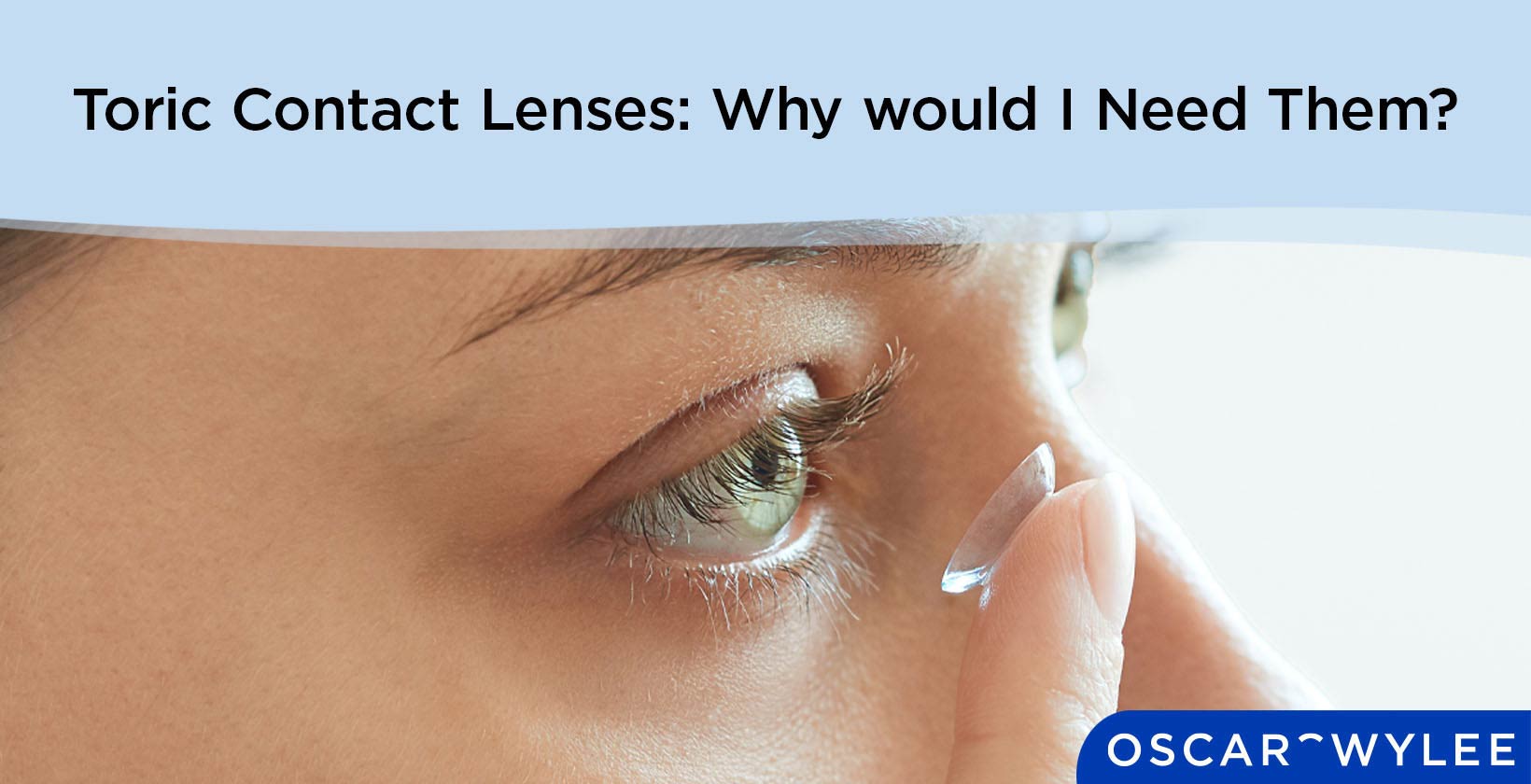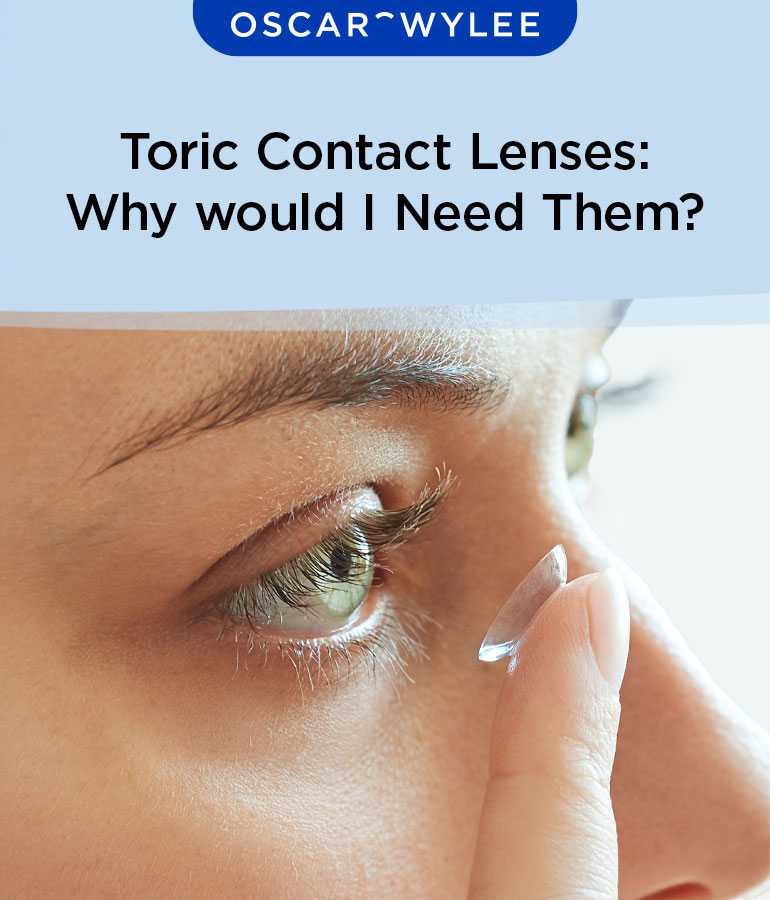Toric Contact Lenses: Why Would I Need Them?
Published on July 25th, 2024
Toric contact lenses are a type of contact lens specifically designed to correct astigmatism. Astigmatism is a type of refractive error, in which a misshapen lens or cornea causes vision issues. A person will only need toric contact lenses if they have astigmatism and on the recommendation of an optometrist. Toric contact lenses work by helping correct this refractive error. The benefits of toric lenses are that they correct astigmatism, are convenient and have a wide range of vision. Toric contact lenses can also come in different types, depending on materials and how long they can be worn. Types of toric contact lenses include soft toric lenses, Rigid Gas Permeable (RGP) toric lenses, disposable toric lenses and extended-wear toric lenses. Keep reading to learn more about toric contact lenses.
It is important to note that Oscar Wylee does not sell toric contact lenses or any other type of contact lenses.
What are Toric Contact Lenses?
Toric contact lenses are a type of contact lenses designed to correct astigmatism. Toric contact lenses are shaped differently from normal contact lenses. Toric contact lenses are shaped like a slice of a ring doughnut, whereas normal contact lenses are shaped like a slice out of a sphere.
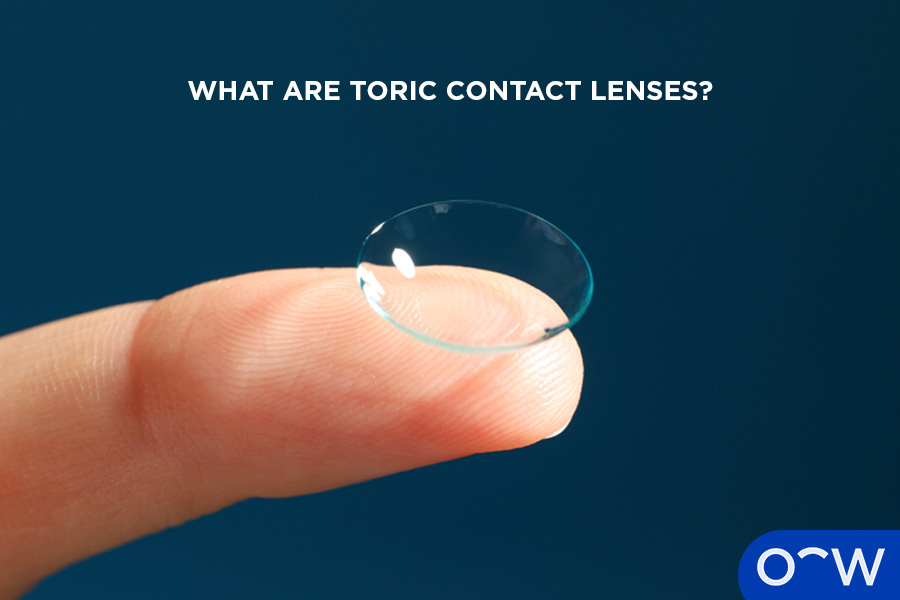

What Does Toric Mean?
Toric refers to something that is shaped like a torus. A Torus is a three-dimensional shape resembling a ring doughnut.
What is the Purpose of Toric Lenses?
The purpose of toric contact lenses is to correct the refractive error astigmatism. Astigmatism occurs when the cornea or lens is irregularly shaped, impacting how light is reflected onto the retina, and disrupting how a person sees. Symptoms of astigmatism include blurry vision, eye strain or eye fatigue, and squinting to see clearly.
Why Would I Need Toric Lenses?
A person would only need to use toric contact lenses if they have astigmatism and on the recommendation of their optometrist. Toric lenses are designed specifically to correct astigmatism and are not suitable for those who require correction for other refractive errors such as myopia or hyperopia.
How do Toric Lenses Work?
Toric lenses work the same way other contact lenses and prescription glasses work; by bending light entering the eye, so it hits the retina properly. The retina is the light-sensitive layer at the back of the eye. When light hits the eye, it is refracted onto the retina, which processes it into electrical signals to send to the brain. If a person has a refractive error such as myopia, hyperopia or astigmatism, light doesn't refract onto the retina properly, due to the shape of the lens or cornea. Prescription glasses and contact lenses, including toric lenses, work by directing light onto the retina and correcting these vision issues.
It is important to note that Oscar Wylee does not sell toric contact lenses or any other type of contact lenses.
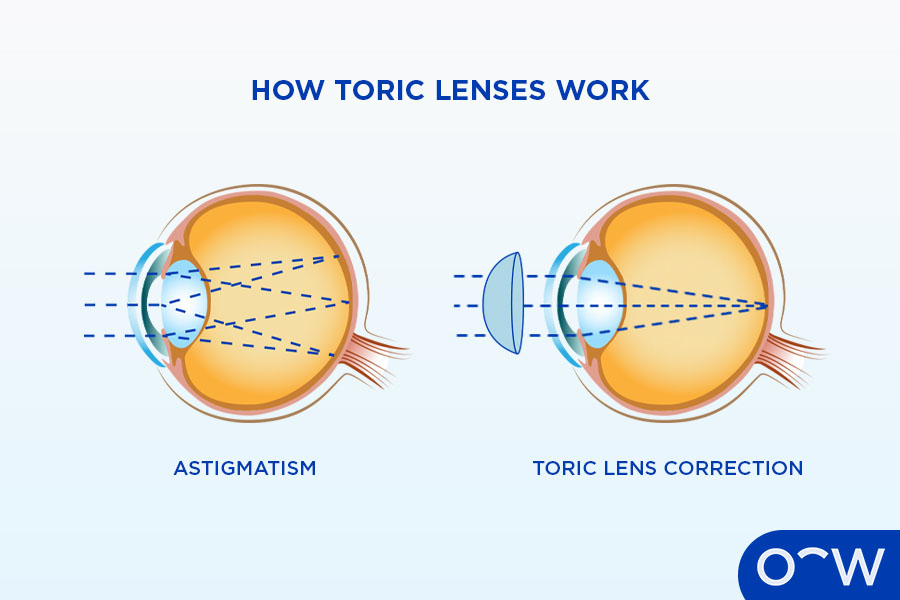

How do Toric Contact Lenses Treat Astigmatism?
Toric lenses do not treat astigmatism, they instead help to correct vision issues caused by this refractive error. Astigmatism is a type of refractive error, in which a misshapen lens or cornea causes multiple points at which light focuses, causing vision issues. According to the Cleveland Clinic, astigmatism occurs when the lens or the cornea is too curved, meaning light reflects unevenly onto the retina. Toric lenses correct astigmatism in the same way other contact lenses do; by helping the light refract onto the retina properly. Toric lenses are shaped differently from normal contact lenses, to account for the misshapen lens or cornea.
What are the Types of Toric Contact Lenses?
The types of toric lenses are determined, like other contact lenses, by how long they can be worn, and what materials they are made of. The types of toric contact lenses can include soft toric lenses, Rigid Gas Permeable (RGP) toric lenses, disposable toric lenses and extended-wear toric lenses. The types of toric contact lenses are listed below.
- Soft Toric Lenses: Soft toric lenses are lenses that are flexible and made from softer materials like hydrogel.
- Rigid Gas Permeable (RGP) Lenses: Rigid gas permeable (RGP) or hard contact lenses, refer to the contacts made from oxygen-permeable polymers and are stiffer than soft contacts.
- Disposable Toric Lenses: Disposable toric lenses refer to a type of contact lens that is designed to be worn once, during the day, and then thrown away.
- Extended Wear Toric Lenses: Extended wear toric lenses refer to lenses that are designed to be worn for an extended period, on the recommendation of an optometrist or eye care professional.
1. Soft Toric Lenses
Soft toric contact lenses are toric lenses that are made from soft materials such as hydrogel or silicone hydrogels. Soft toric lenses are softer and more flexible than rigid gas permeable (RGP) lenses and are easier to take in and out of the eye. Normal contact lenses can also be made of these softer materials.
2. Rigid Gas Permeable (RGP) Lenses
Rigid Gas Permeable (RGP) lenses are lenses made from oxygen-permeable silicone polymers, according to the Cleveland Clinic. RGP lenses, also known as hard contact lenses are more durable than soft contact lenses and stiffer to the touch. Toric lenses can come as hard contact lenses, but soft toric lenses are more commonly chosen, according to Hopkins Eye Centre.
3. Disposable Toric Lenses
Disposable toric contact lenses refer to toric lenses that are worn once, during the day, and then disposed of. Disposable contact lenses are also referred to as daily-wear contact lenses. The exact time disposable contact lenses should be worn for will be recommended by an eye care or healthcare professional.
4. Extended Wear Toric Lenses
Extended-wear toric contact lenses are lenses designed to be worn for an extended period of time. Extended-wear contact lenses can be reused for an extended period, sometimes for days or weeks at a time. It is important to follow the instructions from your eye care or healthcare provider on how long contact lenses can be worn.
It is important to note that Oscar Wylee does not sell toric contact lenses or any other type of contact lenses.
What are the Benefits of Toric Contact Lenses?
The benefits of toric contact lenses include astigmatism correction, convenience and a wide range of vision. The benefits of toric contact lenses are listed below.
- Astigmatism correction: Astigmatism correction is the main benefit of toric contact lenses. Toric lenses are designed to correct astigmatism specifically.
- Convenience: Toric contact lenses, like other contact lenses, are convenient as they are placed on the eye, and can remain there all day. You do not need to worry about them falling off the face or being scratched like with glasses. They can also be worn safely during sports
- Wide range of vision: Toric contact lenses are placed on the eye, as opposed to on the face like glasses, meaning they provide a wider range of vision with a natural field of view.
What is the Difference Between Toric and Normal Contact Lenses?
The main difference between toric contact lenses and normal contact lenses is their shape. Normal contact lenses are shaped like a slice of a sphere to suit the ball-shaped cornea or lens, whereas toric contact lenses are shaped like a slice of a ring doughnut to account for the shape of the rugby ball-shaped cornea or lens. Toric contact lenses are shaped differently from normal contact lenses as they are designed to correct astigmatism specifically. Astigmatism occurs when the lens or the cornea is misshapen, generally too curved like a rugby ball.
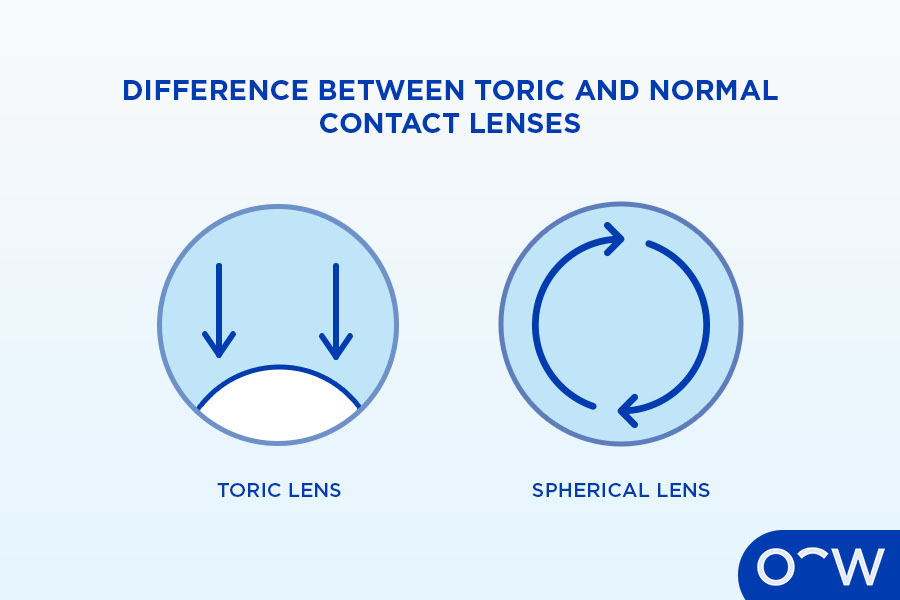

What are the Disadvantages of Toric Contact Lenses?
The disadvantages of toric contact lenses are that there is an adjustment period when first wearing them, there is more care required with toric lenses than glasses and a risk of eye infections. The disadvantages of toric contact lenses are listed below.
- Adjustment period: There is an adjustment period when first using toric contact lenses or any contact lenses. It may take the eyes some time to adjust to the feel of contacts directly on the eye as well as a new prescription. It may also take time for the wearer to figure out how to use and care for contact lenses.
- More care required: There is more care required when using toric contact lenses, or any contact lenses, than using glasses. Putting toric lenses in and taking them out of the eye requires skill and good hygiene. Storing and cleaning toric lenses also involves extra time and care.
- Risk of eye infections: A risk of eye infections is a disadvantage of toric contact lenses, or contact lenses in general as they touch the eye directly and require more care surrounding hygiene. Eye infections that may be caused by wearing contacts include conjunctivitis and keratitis.
How are Toric Contact Lenses Made?
The way toric contact lenses are made depends on what material they are made of. According to Science Direct, soft toric contact lenses are generally mass-produced using cast moulding or prism ballasting. Cast moulding involves pouring material into a mould, shaped like the toric lens. Prism ballasting helps to stabilise a lens.
Can You Wear Toric Contact Lenses All the Time?
The length of time a person can wear toric contact lenses for is determined by the type of lenses they are. Toric contact lenses can be worn every day if they are extended-wear lenses. Extended wear lenses may be designed to be worn during the day, and at night, for extended periods. If a person has daily or disposable contact lenses, these must be thrown away after one use.
Are Toric Contact Lenses More Expensive than Normal Contact Lenses?
The cost of toric contact lenses or any contact lens will be dependent upon the company they are purchased from and their manufacturing process. Toric contact lenses may be slightly more expensive than standard contact lenses, as they are differently shaped, and may need to undergo more work or manufacturing to be made.
It is important to note that Oscar Wylee does not sell toric contact lenses or any other type of contact lenses.


